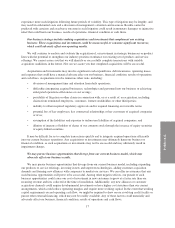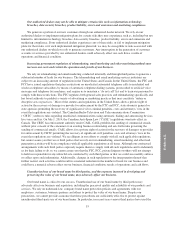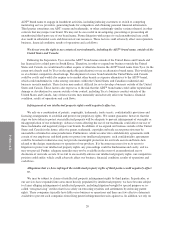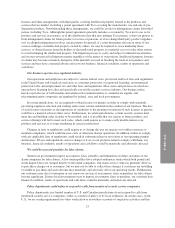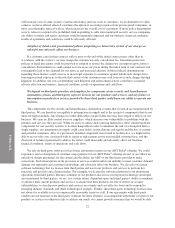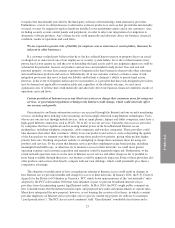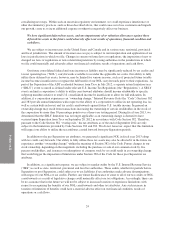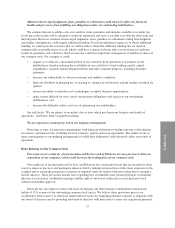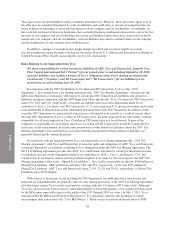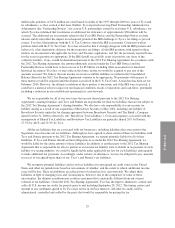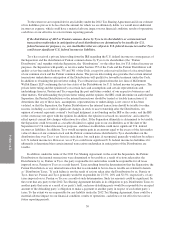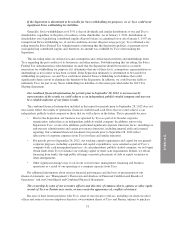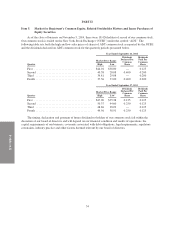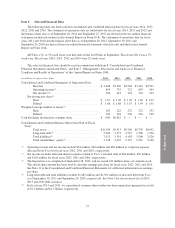ADT 2014 Annual Report Download - page 93
Download and view the complete annual report
Please find page 93 of the 2014 ADT annual report below. You can navigate through the pages in the report by either clicking on the pages listed below, or by using the keyword search tool below to find specific information within the annual report.
FORM 10-K
Material adverse legal judgments, fines, penalties or settlements could adversely affect our financial
health and prevent us from fulfilling our obligations under our outstanding indebtedness.
We estimate that our available cash, our cash flow from operations and amounts available to us under our
revolving credit facility will be adequate to fund our operations and service our debt over both the short term and
the long term. However, material adverse legal judgments, fines, penalties or settlements arising from litigation
and similar contingencies could require additional funding. If such developments require us to obtain additional
funding, we cannot provide assurance that we will be able to obtain the additional funding that we need on
commercially reasonable terms or at all, which could have a material adverse effect on our financial condition,
results of operations and cash flows. Such an outcome could have important consequences to holders of shares of
our common stock. For example, it could:
• require us to dedicate a substantial portion of our cash flow from operations to payments on our
indebtedness, thereby reducing the availability of our cash flow to fund working capital, capital
expenditures, research and development efforts and other corporate purposes, including dividend
payments;
• increase our vulnerability to adverse economic and industry conditions;
• limit our flexibility in planning for, or reacting to, changes in our business and the markets in which we
operate;
• restrict our ability to introduce new technologies or exploit business opportunities;
• make it more difficult for us to satisfy our payment obligations with respect to our outstanding
indebtedness; and
• increase the difficulty and/or cost to us of refinancing our indebtedness.
See risk factor “We are subject to securities class actions which may harm our business and results of
operations,” and Part I, Item 3 Legal Proceedings.
We are exposed to counterparty risk in our hedging arrangements.
From time to time, we enter into arrangements with financial institutions to hedge exposure to fluctuations
in currency and interest rates, including forward contracts, options and swap agreements. The failure of one or
more counterparties to our hedging arrangements to fulfill their obligations could adversely affect our results of
operations.
Risks Relating to Our Common Stock
Provisions in our certificate of incorporation and by-laws and of Delaware law may prevent or delay an
acquisition of our company, which could decrease the trading price of our common stock.
Our certificate of incorporation and by-laws and Delaware law contain provisions that are intended to deter
coercive takeover practices and inadequate takeover bids by making such practices or bids more expensive to the
acquiror and to encourage prospective acquirors to negotiate with our board of directors rather than to attempt a
hostile takeover. These provisions include rules regarding how stockholders may present proposals or nominate
directors for election at stockholder meetings and the right of our board of directors to issue preferred stock
without stockholder approval.
Delaware law also imposes some restrictions on mergers and other business combinations between any
holder of 15% or more of our outstanding common stock and us. We believe these provisions protect our
stockholders from coercive or otherwise unfair takeover tactics by requiring potential acquirors to negotiate with
our board of directors and by providing our board of directors with more time to assess any acquisition proposal.
27


